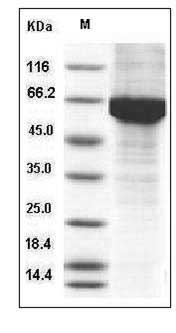-
Product Name
Human HSP70/HSPA1A (His Tag) recombinant protein
- Documents
-
Description
In cooperation with other chaperones, Hsp70s stabilize preexistent proteins against aggregation and mediate the folding of newly translated polypeptides in the cytosol as well as within organelles. These chaperones participate in all these processes through their ability to recognize nonnative conformations of other proteins. They bind extended peptide segments with a net hydrophobic character exposed by polypeptides during translation and membrane translocation, or following stress-induced damage. In case of rotavirus A infection, serves as a post-attachment receptor for the virus to facilitate entry into the cell. Essential for STUB1-mediated ubiquitination and degradation of FOXP3 in regulatory T-cells (Treg) during inflammation (PubMed:23973223). {PubMed:16537599, PubMed:22528486, PubMed:23973223}.
-
Protein name
Heat shock 70 kDa protein 1B
-
Uniprot ID
P0DMV9
-
Gene Name
HSPA1B
-
Source/Expression Host
Baculovirus-Insect Cells
-
Expression Plasmid/cDNA
A DNA sequence encoding the human HSPA1A (NP_005337.2) (Ala2-Asp641) was expressed, with a polyhistidine tag at the N-terminus.
-
Protein Species
Human
-
Molecular weight
The recombinant human HSPA1A consists of 658 amino acids and predicts a molecular mass of 72.2 kDa.
-
Purity
> 85 % as determined by SDS-PAGE
-
Activity
1. Measured by its ability to bind human PARP1 in a functional ELISA.
2. Measured by its ability to bind mouse PARP1 in a functional ELISA. -
Validations

Human HSP70 / HSPA1A Protein (His Tag) SDS-PAGE
Related Products / Services
Please note: All products are "FOR RESEARCH USE ONLY AND ARE NOT INTENDED FOR DIAGNOSTIC OR THERAPEUTIC USE"
